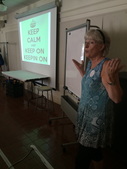
Happy New Year!! Some of the words that I would cheerfully use to describe the new year are clean, fresh, unwritten, renew, promising... I could go on. My choice of those words would tell you something about me. If I were to use them in sentences, you would be able to "hear" my voice, my personality, my attitude - just by reading the words I decided to place on the page.
Here's an interesting story. My two colleagues who attended the Joan Oates Institute with me last summer and I had the idea to ask each faculty and staff member at our school to think of one word that expressed whatever inspired, motivated, or moved them - either professionally or personally. We wanted to turn our collective attention away from test scores and toward the arts and creative expression of self. We gathered all of the words our colleagues submitted and had a team shirt made using Wordle to include everyone's inspiration.
Um...
Have you seen any of the press surrounding the "One Word" movement? Unbeknownst to us, it's already a "thing", and has been for awhile. Where have I been? Under a rock??
Come to find out that there is a whole movement surrounding one word. I saw something about it on the Today Show. There is an artist who makes bracelets with people's words, including for some pretty famous personalities! Just google that phrase and you will see what I mean. I have also been asked on Facebook to provide the one word that will define 2016 for me.
Not surprisingly, I chose the word Voice, for both our team shirt and as a response to my Facebook friend's request.
Voice.
When we are writing, our readers hear our voice through the layers of decisions we make as we write - the words, sentence structures, punctuation choices, and our purposeful placement of ideas on the page. Really, not one of those things by itself completely captures a writer's voice. Rather, it is the way that the writer arranges all of those things on the page that expresses his or her self to the reader. I believe it is the single most important aspect of communication between writer and reader.
So, as I am trying to assess our first grade writers' seasons books, I am getting somewhat frustrated. Using a standards-based grading system is as new for me as 2016! This is the first time I am scoring student work using only the state standards as targeted skill scoring points. And, in some ways, that's fine. I mean, for example, we do need to know through assessment of written work whether a student can move a project through the writing process (generate ideas, brainstorm pre-write, draft, organize, revise, edit, publish), which is a large part of this first grade state standard. But, as I am using those standards to figure out how our writers are developing as communicators, something is missing. Something BIG.
Voice. Or rather, a place on the rubric that celebrates strong voice, or reports a need to go back and help that student find, define, and use his or her writer's voice. Or anything in between.
Let me give you an example. Below is one of our writers' books. While I can give her credit for her outstanding word choice on standard 1.13c, "Revise their written pieces by adding descriptive words (adjectives) when writing about people, places, things, and events", how do I score her significantly overall strong voice using the standards language targets -use previous experience, participate in teacher-directed brainstorming, write informative texts, provide facts, state an opinion, add descriptive words, focus on the topic, use complete sentences?
Here's an interesting story. My two colleagues who attended the Joan Oates Institute with me last summer and I had the idea to ask each faculty and staff member at our school to think of one word that expressed whatever inspired, motivated, or moved them - either professionally or personally. We wanted to turn our collective attention away from test scores and toward the arts and creative expression of self. We gathered all of the words our colleagues submitted and had a team shirt made using Wordle to include everyone's inspiration.
Um...
Have you seen any of the press surrounding the "One Word" movement? Unbeknownst to us, it's already a "thing", and has been for awhile. Where have I been? Under a rock??
Come to find out that there is a whole movement surrounding one word. I saw something about it on the Today Show. There is an artist who makes bracelets with people's words, including for some pretty famous personalities! Just google that phrase and you will see what I mean. I have also been asked on Facebook to provide the one word that will define 2016 for me.
Not surprisingly, I chose the word Voice, for both our team shirt and as a response to my Facebook friend's request.
Voice.
When we are writing, our readers hear our voice through the layers of decisions we make as we write - the words, sentence structures, punctuation choices, and our purposeful placement of ideas on the page. Really, not one of those things by itself completely captures a writer's voice. Rather, it is the way that the writer arranges all of those things on the page that expresses his or her self to the reader. I believe it is the single most important aspect of communication between writer and reader.
So, as I am trying to assess our first grade writers' seasons books, I am getting somewhat frustrated. Using a standards-based grading system is as new for me as 2016! This is the first time I am scoring student work using only the state standards as targeted skill scoring points. And, in some ways, that's fine. I mean, for example, we do need to know through assessment of written work whether a student can move a project through the writing process (generate ideas, brainstorm pre-write, draft, organize, revise, edit, publish), which is a large part of this first grade state standard. But, as I am using those standards to figure out how our writers are developing as communicators, something is missing. Something BIG.
Voice. Or rather, a place on the rubric that celebrates strong voice, or reports a need to go back and help that student find, define, and use his or her writer's voice. Or anything in between.
Let me give you an example. Below is one of our writers' books. While I can give her credit for her outstanding word choice on standard 1.13c, "Revise their written pieces by adding descriptive words (adjectives) when writing about people, places, things, and events", how do I score her significantly overall strong voice using the standards language targets -use previous experience, participate in teacher-directed brainstorming, write informative texts, provide facts, state an opinion, add descriptive words, focus on the topic, use complete sentences?
Voice.
This writer is so expressive, and she is clearly artistically driven to communicate to her reader all that she knows to be true about winter. How does our standards based scoring system capture her magnificent voice?
It doesn't. And herein lies the truth for us writing teachers. There is a place and a need for scoring students using standards. But, we must remember that the thinking piece of being a writer - all the decisions I mentioned above - those inherent habits of mind that define the act of communication that happens between the writer and reader - they exist beyond the language of state standards. And that thinking and deciding and presenting of ideas is what makes a writer a writer.
Look for it. Dig for it. Do a happy dance when you find it. A writer's voice is the heartbeat of any writing.
Read our young writer's story again. I hear it. You hear it.
Voice. She owns it!!!
We better believe it.
#allkidscanwrite
This writer is so expressive, and she is clearly artistically driven to communicate to her reader all that she knows to be true about winter. How does our standards based scoring system capture her magnificent voice?
It doesn't. And herein lies the truth for us writing teachers. There is a place and a need for scoring students using standards. But, we must remember that the thinking piece of being a writer - all the decisions I mentioned above - those inherent habits of mind that define the act of communication that happens between the writer and reader - they exist beyond the language of state standards. And that thinking and deciding and presenting of ideas is what makes a writer a writer.
Look for it. Dig for it. Do a happy dance when you find it. A writer's voice is the heartbeat of any writing.
Read our young writer's story again. I hear it. You hear it.
Voice. She owns it!!!
We better believe it.
#allkidscanwrite
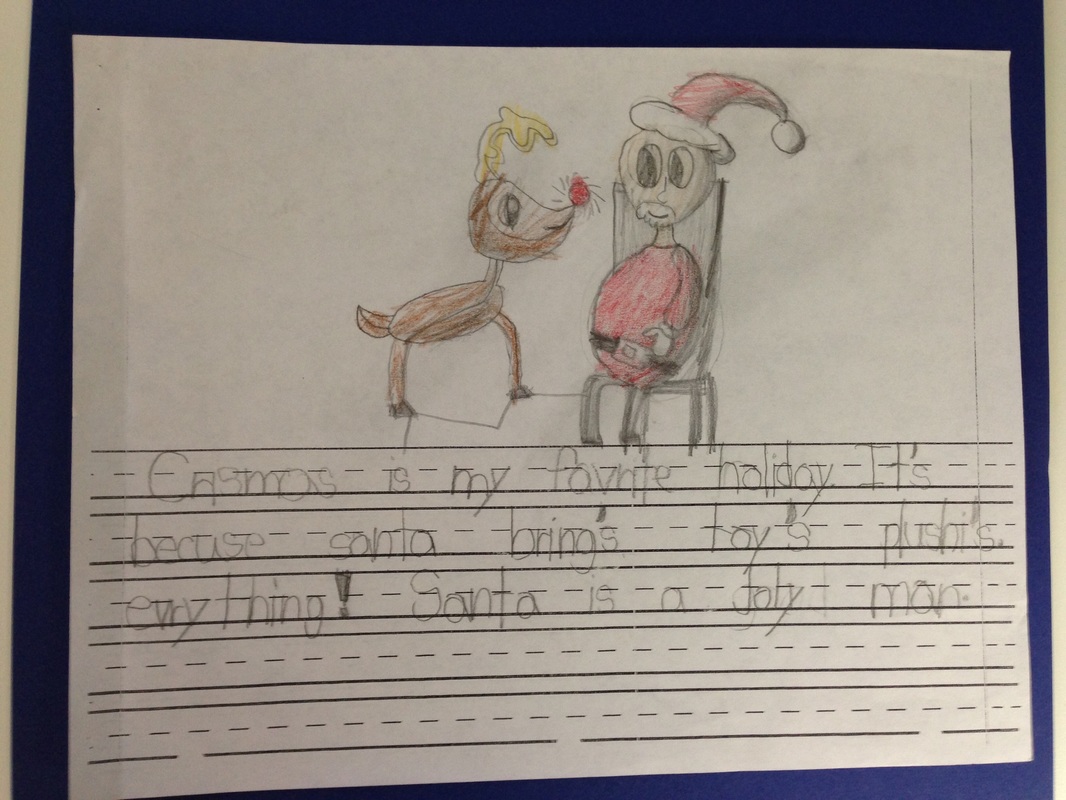
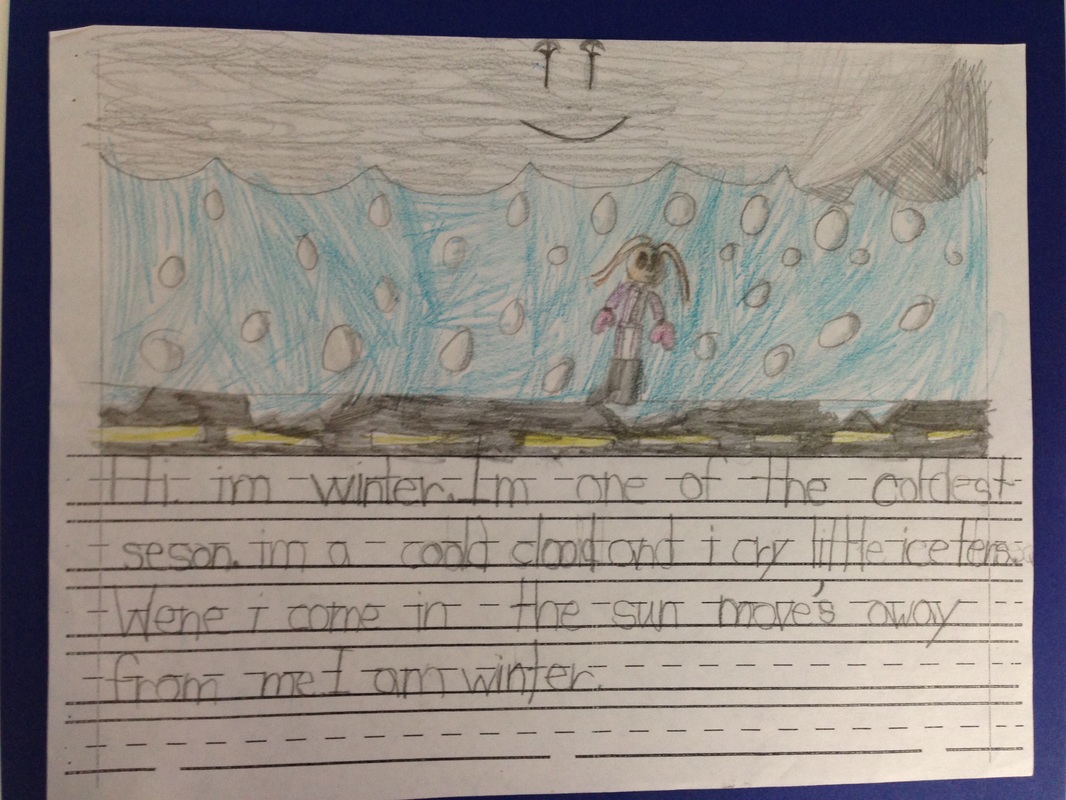
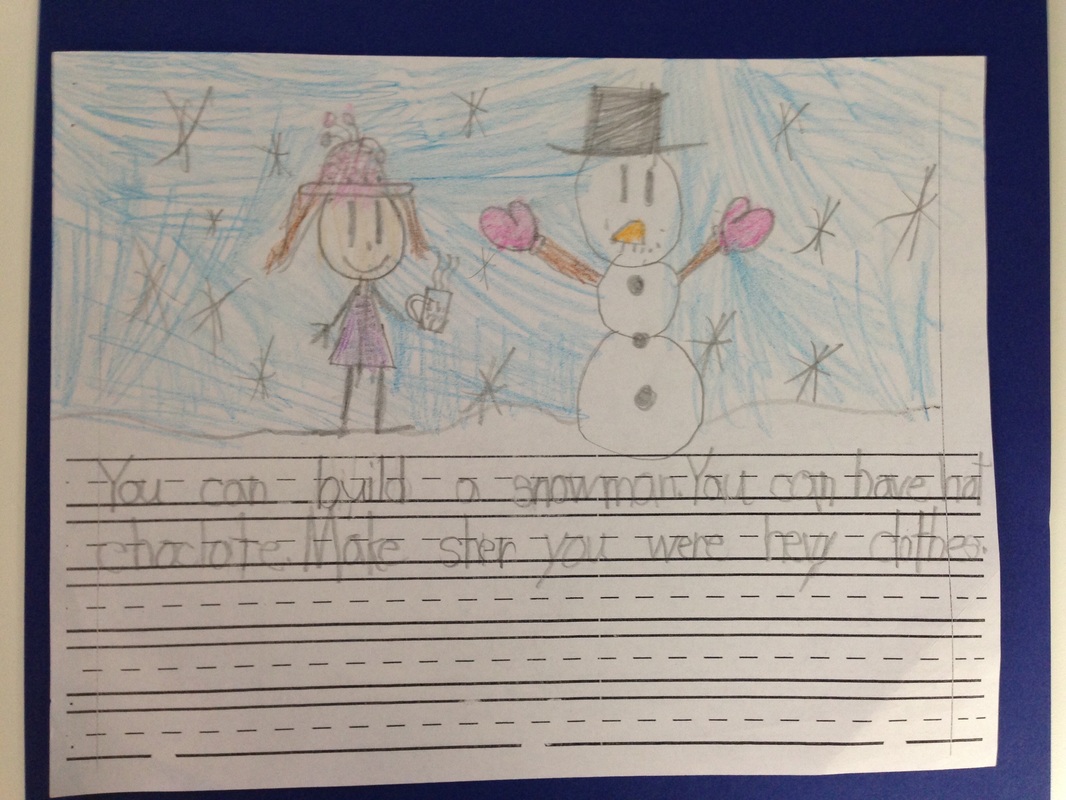
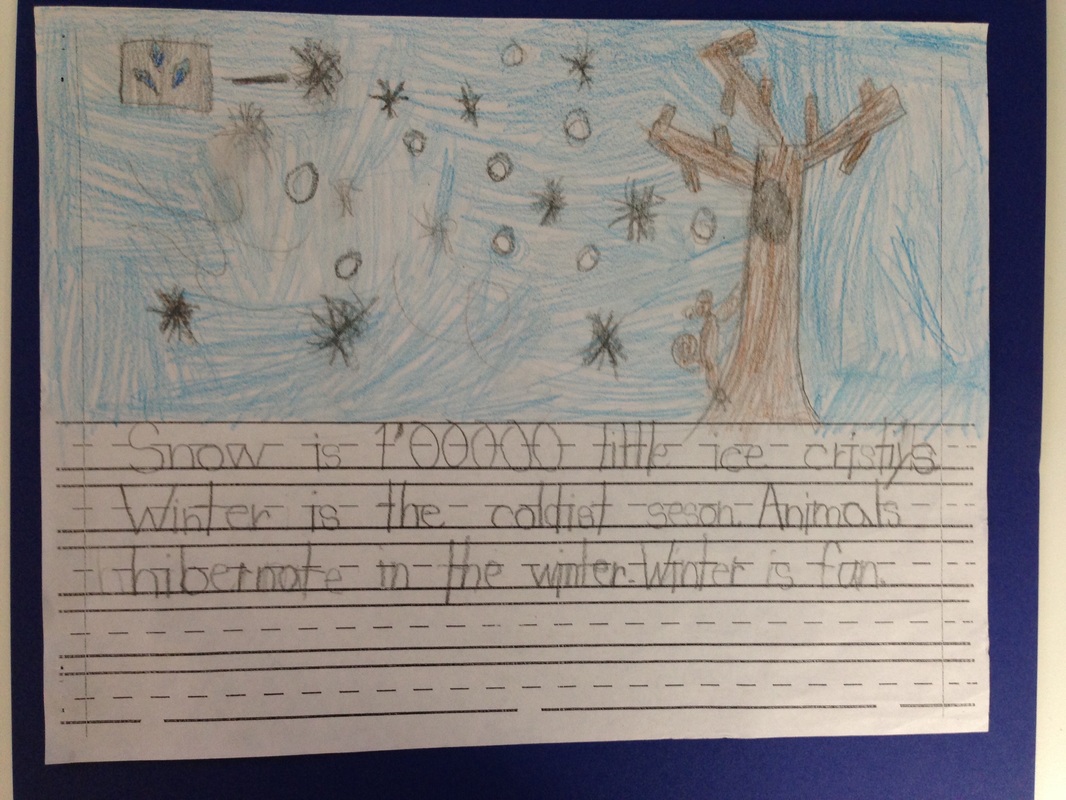
 RSS Feed
RSS Feed
